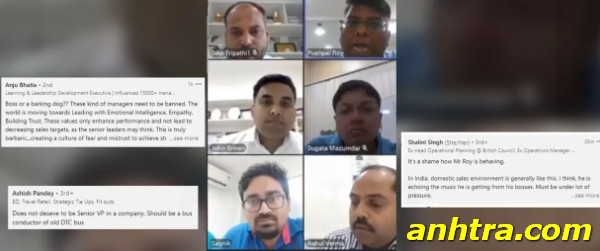HDFC Bank Viral Video: Toxic Work Environment and Action Taken
The recent viral video of HDFC Bank has brought to light the toxic work environment prevailing within the organization. The video showcases a senior vice president, Pushpal Roy, berating his colleagues during an online meeting over unmet targets. This incident has not only shed light on the detrimental work culture within HDFC Bank but has also raised concerns about the potential impact on customer experience, particularly in terms of misselling policies and investment products. Join us to learn about the truth of the video and the lessons learned from the incident. Let’s start with anhtra.com to know HDFC Bank Viral Video

I. What is HDFC Bank Viral Video?
The viral video that circulated on social media revealed a distressing glimpse into the toxic work environment within HDFC Bank. In the video, senior vice president Pushpal Roy is seen berating his colleagues during an online meeting, primarily focusing on their failure to meet targets.
Roy’s behavior in the video was characterized by aggressive language and a stern tone. He can be observed shouting at his subordinates, displaying a lack of patience and respect towards them. Instances of him using derogatory language and telling employees to “shut up” were also captured in the video, further illustrating the hostile atmosphere.
One specific interaction highlighted in the video involves Roy addressing an employee named John. In a harsh manner, Roy informs John that he will issue an HR memo to both John and another employee named Tithir. This interaction showcases the authoritative and unsupportive approach Roy takes towards his subordinates.
The video’s circulation on social media platforms drew attention to the toxic work environment prevailing within HDFC Bank and sparked discussions about the impact of such behavior on employee morale, job satisfaction, and overall well-being.

II. HDFC Bank’s Response and Action
After the preliminary inquiry, HDFC Bank made the decision to suspend the officer involved in the incident, who was located in Kolkata. This action was taken to ensure a fair investigation into the matter and to prevent any further disruption to the work environment.
HDFC Bank has a zero-tolerance policy for any form of misconduct at the workplace, including behaviors that undermine a respectful and collaborative atmosphere. The bank is committed to treating all its employees with dignity and respect, fostering an environment that values their contributions and well-being.
To ensure a comprehensive understanding of the incident and determine appropriate measures, HDFC Bank has initiated a detailed investigation. This investigation will be conducted in accordance with the bank’s established conduct guidelines, ensuring a fair and impartial process.
By promptly suspending the officer involved and initiating a thorough investigation, HDFC Bank demonstrates its commitment to addressing workplace misconduct and fostering a culture of transparency, accountability, and respect for its employees. The bank’s actions aim to create a supportive work environment where employees can thrive and contribute to the bank’s overall success.

III. Public Reaction and Call for Strict Labor Laws
Many users on LinkedIn have voiced their demand for strict action against the behavior showcased in the video. They emphasize the importance of holding individuals accountable for their actions and ensuring that such incidents are not tolerated in the workplace. Users have called for strong measures to be taken against those responsible to deter similar behavior in the future.
Comments from LinkedIn users reflect their concern about the prevalence of toxic work environments not just within HDFC Bank but in various organizations as well. They highlight the need for a cultural shift where employee well-being and respect are given priority over solely focusing on numbers, profits, and share prices. Users recognize the significance of establishing a positive work culture that fosters growth, collaboration, and ethical practices.
The public reaction to the HDFC Bank incident underscores the broader issue of toxic work environments in the corporate sector. It serves as a wake-up call to organizations, urging them to address these issues seriously and make necessary changes to create healthier and more supportive work environments. There is a growing recognition of the need for cultural transformation within organizations, emphasizing values such as respect, empathy, and employee well-being.
Furthermore, the incident has sparked a discussion about the importance of enacting stricter labor laws in India. The calls for such laws aim to ensure that employees are protected from workplace toxicity and that organizations are held accountable for maintaining a healthy work environment. Stricter regulations can play a crucial role in preventing incidents of misconduct and fostering a positive work culture where employees can thrive and contribute their best.
Overall, the public response to the HDFC Bank incident reflects a growing awareness of the need for cultural change, stricter labor laws, and a renewed emphasis on creating supportive work environments that prioritize the well-being and dignity of employees.

IV. Importance of a Positive Work Culture and Employee Well-being
In today’s dynamic business landscape, organizations face economic uncertainties, digital transformations, and the adoption of hybrid working models. These changes can significantly impact employees’ experiences and well-being. A positive work culture becomes even more essential during these times, providing a sense of stability, support, and motivation.
Organizations must prioritize employee well-being beyond the pursuit of financial goals. While numbers and profits are vital for business success, they should not be the sole focus. Valuing and investing in employees’ well-being can lead to increased engagement, loyalty, and ultimately, improved business outcomes.
Treating all employees, regardless of their position, with respect and dignity is paramount. Every individual within an organization contributes to its success, and their contributions should be recognized and valued. Fostering a culture of inclusivity, fairness, and equal treatment enhances employee morale and fosters a positive work environment.
When employees feel valued, respected, and supported, they are more likely to perform at their best, exhibit loyalty, and actively contribute to the organization’s goals. A positive work culture promotes collaboration, creativity, and innovation, enabling organizations to adapt to changing business landscapes effectively.
Moreover, a healthy work environment can reduce stress, prevent burnout, and enhance overall mental and physical well-being. This, in turn, leads to higher job satisfaction, lower turnover rates, and a positive employer brand. Organizations that prioritize employee well-being gain a competitive edge in attracting and retaining top talent.
In conclusion, a positive work culture and employee well-being are critical elements for organizational success. The HDFC Bank incident serves as a reminder of the importance of fostering a supportive and respectful environment. By recognizing the impact of economic uncertainties, digital transformations, and the hybrid working model, organizations can prioritize employee well-being and create a culture that values respect, fairness, and inclusivity. Treating all employees with dignity and respect, regardless of their position, is essential for building a harmonious and thriving work environment.

V. Conclusion
The HDFC Bank viral video incident has shed light on the toxic work environment experienced by employees within the organization. The video depicted a senior vice president, Pushpal Roy, berating his colleagues during an online meeting over unmet targets, using aggressive language and a stern tone. HDFC Bank responded promptly by suspending the officer in Kolkata and initiating a detailed investigation in accordance with their conduct guidelines. The bank reaffirmed its zero-tolerance policy for workplace misconduct and its commitment to treating employees with dignity and respect.
The incident sparked a significant public reaction, particularly on social media platforms like LinkedIn. Users expressed their concerns about workplace toxicity and called for strict action against such behavior. Calls for stricter labor laws were made, emphasizing the need to address and prevent toxic work environments in India.
A positive work culture and a supportive environment are crucial for employees to thrive and contribute effectively. The incident highlights the importance of fostering an atmosphere of respect, collaboration, and growth in organizations. It also raises concerns about the potential impact on customer experience and the misselling of policies and investment products by bank employees.
India still faces challenges in providing a conducive work environment, as incidents of workplace toxicity continue to come to the forefront. It calls for continuous efforts to improve the situation, including the enactment of stricter labor laws, cultural transformation within organizations, and a shift towards prioritizing employee well-being alongside financial goals. Creating a positive work culture that treats all employees with respect and dignity is essential for fostering growth, learning, and skill development.
In conclusion, the HDFC Bank viral video incident serves as a reminder of the importance of a healthy work environment and the need for organizations to prioritize employee well-being. It highlights the challenges India faces in providing conducive work environments and calls for concerted efforts to create a culture of respect, collaboration, and growth within organizations across the country.








